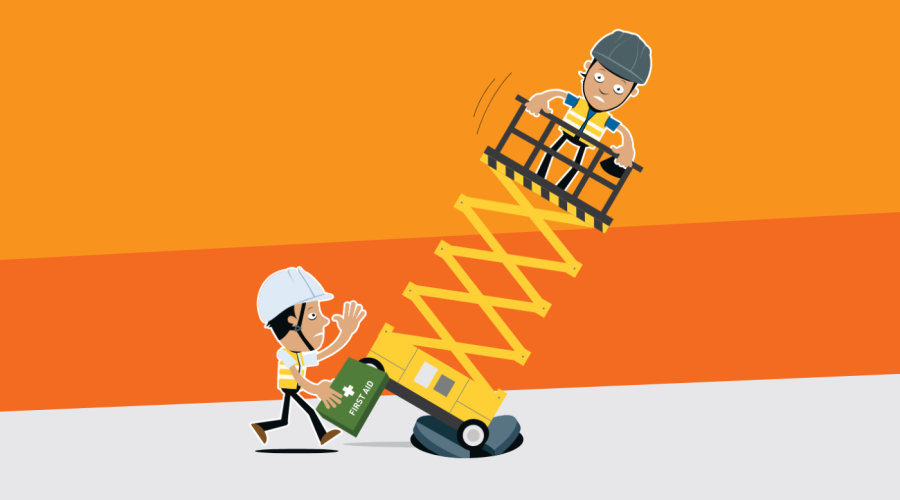IPAF welcomes updates to British Standards on MEWPs and MCWPs
The International Powered Access Federation (IPAF) welcomes the forthcoming introduction of updated British standards regarding the safe use of Mobile Elevating Work Platforms (MEWPs) and Mast Climbing Work Platforms (MCWPs). The new British Standards (BS) 8460 and 7981 supersede the 2005 and 2002 versions respectively, which will be withdrawn, and are published on 31 October 2017.
Some of the main changes to BS 8460 include enhanced guidance on risk management, loading and unloading machines, understanding new safety features and fall prevention during maintenance to machines. There is additional guidance on warning symbols and annexes in the standard on self-familiarisation and rescue plans.
The new MEWP standard takes into account the BS EN 280, which specifies design calculations, construction standards, stability criteria, safety, examination and testing requirements and was drawn up with the participation of HSE representatives and based on feedback from IPAF and its members.
Rupert Douglas-Jones, Technical & Safety Officer at IPAF, comments: “It became apparent to IPAF and our members that the existing BS 8460 and BS 7981 hadn’t been updated for well over a decade and as a result the changing nature of the industry and the technical and safety guidance had somewhat overtaken the standard published.
“Following extensive feedback and consultation we are pleased that important considerations such as risk management, loading and unloading, modern MEWP safety measures, decals and warning stickers, familiarisation and rescue plans have all been included in the new standard for MEWPs.
“The MCWP version also covers risk assessments, rescue plans and familiarisation, and includes example inspection, maintenance, and thorough examination checklists and a simplification of the terms and responsibilities relating to MCWP operations. Of particular significance in the MCWP standard is the table outlining specific training requirements, which IPAF can of course help operators comply with.”
BS 8460 is a full revision of the standard, and includes the following key changes:
- New safe use recommendations taking into account the latest edition of BS EN 280;
- enhanced recommendations for the risk management process;
- new sub-clauses concerning the loading and unloading MEWPs and for operating MEWPs near sources of electromagnetic radiation in telecommunications;
- added recommendations for identifying the implications of new safety features on machines, such as telematics, data-logging, load sensors and machine security;
- new recommendations for the prevention of falls while carrying out maintenance on the machine chassis/structure, the prevention of entrapment, and the operation of secondary guarding;
- changes to reflect recent legislation, eg the Construction Design and Manufacturing (CDM) Regulations 2015, and the replacement of HSE guidance CIS 58 with GEIS6;
- references to various guidance documents from the Strategic Forum for Construction, Plant Safety Group on ground conditions, medical fitness to operate construction plant, avoiding trapping/crushing injuries, and inspection and thorough examination;
- new definitions for "primary guarding", "secondary guarding", "user" and "deck-riding";
- new informative annexes giving guidance on symbols for MEWPs, machine modifications and CE marking, and controls in addition to the platform controls; self-familiarisation; and giving an example of a rescue plan hierarchy.
The new MCWP British Standard supersedes BS 7981:2002, which will be withdrawn, and is also published on 31 October. The updated standard sets out guidance and recommendations to ensure that MCWPs are installed, dismantled, maintained, thoroughly examined and used in a safe manner, and includes these key changes:
- Greater detail on the implementation of a risk assessment;
- simplification of the responsibilities for the safe operation of an MCWP, including: The removal of the term “user” and its replacement with “operator”; the introduction of recommendations for the “appointed person (user)” and the “appointed person (supplier)”; the recommendation for a trained installer to remove and reinstall a top tie; and clarification of the role of the demonstrator.
- The replacement of “induction” with “familiarisation” and additional recommendations for familiarisation;
- additional recommendations for: Alteration; thorough examination, including examination following installation, reconfiguration and repositioning; the use of safety harnesses and the preparation of a rescue plan; record retention;
- a new table giving a mast climbing work platform training needs analysis;
- new example MCWP daily and weekly checklists and a new example checklist for thorough examination.
Tim Whiteman, CEO of IPAF, adds: “IPAF is delighted to see the launch of these new British standards, which every rental company and contractor should now review. These latest versions will make a positive contribution to safe operation and ensure MEWPs and MCWPs remain the safest ways of conducting temporary work at height.”
